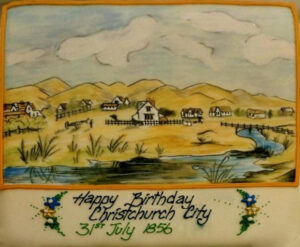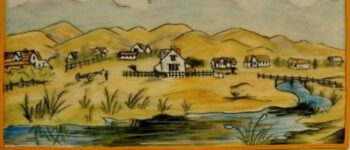1854: New Zealand’s First City, Christchurch
July 31, 2022
By AHNZ

On 31 July, 1856, Christchurch was first in New Zealand to be qualified as a “city.” Not because it was the eldest or most populated or educated or wealthy or anything of that sort. It was because this most English and Anglican of colonies had great connections with the very English and Anglican Mothership- England. Christchurch’s Pilgim settlers wanted their own Anglican Bishop and for that they would need to be a city so a city they were proclaimed by Queen Victoria’s Royal Charter.
Auckland City (1854-55) was formed and had elections but was dissolved and erased from history (probably by rivals who branded themselves Auckland Provincial Council.) Wellington City was recognised in 1852 by proclamation of Governor Grey as an electoral district of the province of New Munster¹.
Titles like ‘Sir’ and ‘City’ are nominal attributions situated in a particular historical narrative. There’s nothing objective about it however it tells us how people in history thought about themselves. Current mainstream historiography has George Washington as first American President and William Hobson as New Zealand’s first governor but neither of these things are true. Ref. 1840: Who Was Our First Governor? The Answer May Startle You…, AHNZ
Same goes for first Prime Minister. Ref. 1854: New Zealand’s First Prime Minister?, AHNZ
In the 2020s revision of history, the Aotearoa New Zealand era, a group called Māori were the first settlers to New Zealand. These Macron Maori were not conceived of in the previous history narrative at all. Instead they wrote history about Maoris who were the hybrid descendants of an earlier race also called Maoris. Canterbury Museum and the Christchurch Gondola had history displays from this era which now cause friction because, while they haven’t changed, the Aotearoa New Zealand era has come along in the mean time. Ref. 1700: The First Christchurch Gondola, AHNZ
Canterbury Museum had to put up Diversity Blinds over its old Maori display in 2020. What was once obvious, known, and within the Conformity norm had become Deviant. The same thing happened to “colonial” statues of figures an earlier era admired. Ref. Complaints lead to covering of Māori exhibit at Canterbury Museum, Stuff (2020)
An earlier version of New Zealand did not think Maoris or Māori were first. We all accepted readily that Maoris were right in reporting that they had colonised earlier cultures: Moa Hunter, Waitaha, Moriori. If Moa Hunter artifacts were found they would go to a museum. In our current era all is subsumed into one catagory, Macron Maori (Māori ) and given to the local tribe with the most recent claim to the given land area. Some things that were bestowed in the old era by the old rules are even “returned” and “repatriated.”
“Actually there’s no reason to assume this artefact is Maori at all. In New Zealand, when something prehistoric turns up, it is automatically assumed, these days, that it must be Maori. Everything is Maori and in some sense the property of a Maori tribe; This is already decided.” – 1300s: Inangahua Adze, AHNZ
“Statist history informs us this pre-historic flax backpack is “another taonga” called a “poi kawe.” Canterbury Museum curators are thus priming your brain to regard the object as Maori. The truth is they have no idea.” – 1501: Waitaha’s Lost Luggage?, AHNZ
In 1892 Apirana Ngata called Time of Death on Maoris saying “their race is lost.” Ref. 1892: The Past and Future of the Maori, AHNZ and Logan Campbell followed it up by creating One Tree Hill as a giant memorial grave stone to a dead race. What was once true had been re-imagined as untrue for a new history narrative. It didn’t bring the dead race back to life though. It just stops us from being able remember and think about a people who are gone rather than accept and grieve them as Ngata and Campbell did.
Being ‘First City’ is just the same. It’s nothing to do with objective history, nothing to do with identity. It’s False Self self-flattery. Being an ecclesiastical city doesn’t seem to have ever meant much to the people of Christchurch except for this reason. A bit of vanity…the manifestation of will.
“Christchurch then consisted of a store, a church, a bootshop, and a merchant who bought wool and acted as a banker, a land office, and two or three houses.” and “Smart’s Hotel” Ref. Diary of Albert Gray for 1856
The same is true for Dunedin with it’s steepest street. Ref. 1955: Dunedin Inclined to Vanity, AHNZ
And Feminists with their “first” right to vote nonsense. Also not true but something that also doesn’t get in the way of historical narrative. Ref. 1934: Death of Kate Sheppard, AHNZ
—
1 New Zealand Spectator and Cook’s Strait Guardian (1852,) Papers Past
Image ref. Christchurch Cake. Who baked it? Unattributed. Posted by Deon Swiggs, Facebook (2020.) Touched up by AHNZ (2022)
 Like Comment Share
Like Comment Share





